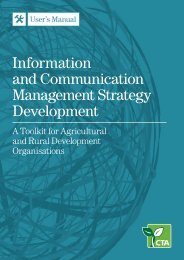Policy framework for Pastoralism in Africa
Policy framework for Pastoralism in Africa
Policy framework for Pastoralism in Africa
- No tags were found...
Create successful ePaper yourself
Turn your PDF publications into a flip-book with our unique Google optimized e-Paper software.
Deep engagement with CSOs will be necessary <strong>in</strong> the pastoral policy development, as these organizationscan provide necessary checks and balances on government decision-mak<strong>in</strong>g dur<strong>in</strong>g thedevelopment and implementation of pastoral policies. Effective opportunities <strong>for</strong> feedback anditerative processes with CSOs and other special <strong>in</strong>terest groups should be allowed <strong>in</strong> the consultativeprocess. Deep engagement with such groups is likely to enrich discussions and facilitate publicacceptance and ownership of the pastoral policy. Where parliamentary review and approval isrequired to validate or legitimize the outcomes of the policy development process, it would be idealto give these and other groups the opportunity to offer additional <strong>in</strong>put.5.3.4 Importance of legislative, <strong>in</strong>stitutional and operationalmeasures <strong>in</strong> pastoral policy developmentOfficials and experts <strong>in</strong>volved <strong>in</strong> the pastoral policy development should know that this exerciserequires comprehensive legislative, <strong>in</strong>stitutional and operational measures to achieve decentralized,transparent, efficient and cost-effective delivery of pastoral services. Thus, review<strong>in</strong>g and restructur<strong>in</strong>gexist<strong>in</strong>g <strong>in</strong>stitutional sett<strong>in</strong>gs, creat<strong>in</strong>g entirely new <strong>in</strong>stitutional arrangements at local,national, regional, cont<strong>in</strong>ental and <strong>in</strong>ternational levels may be necessary. Public or state pastoralsector <strong>in</strong>stitutions could be re-structured to address problems such as scattered and restricted accessto records, poor <strong>in</strong>ternal communication systems, obsolete operat<strong>in</strong>g procedures, overlapp<strong>in</strong>g,conflict<strong>in</strong>g and unclear mandates, duplication of ef<strong>for</strong>ts and responsibilities, and waste of resources.5.3.5 Ensur<strong>in</strong>g availability of f<strong>in</strong>ancial and human resourcesThe development of pastoral policies across the cont<strong>in</strong>ent should take <strong>in</strong>to account full f<strong>in</strong>ancialand economic cost appraisals hence provide <strong>for</strong> adequate resource commitment and mobilization<strong>for</strong> policy development. In addition, pastoral policies should be designed, promulgated and evenlaunched with genu<strong>in</strong>e concern <strong>for</strong> the human resources and other logistical requirements necessaryto carry out the process. In case exist<strong>in</strong>g laws and implementation mechanisms must be replacedwith new policies, new arrangements should be put <strong>in</strong> place to manage the transition. Similarly,transitional arrangements and preparations such as staff capacity build<strong>in</strong>g and tra<strong>in</strong><strong>in</strong>g, publicawareness/<strong>in</strong><strong>for</strong>mation and communication, should always be taken <strong>in</strong>to account <strong>in</strong> the policydevelopment process. These are important issues to be addressed <strong>in</strong> pastoral policy development.5.3.6 Communication plan <strong>for</strong> pastoral policy developmentPastoral policy development will require effective and robust communication through a variety ofchannels <strong>in</strong>clud<strong>in</strong>g newspapers, television messages, radio broadcasts and newsletters. Effective communicationshould be <strong>in</strong>tegral and crosscutt<strong>in</strong>g. It requires the development of a coherent strategy thattakes <strong>in</strong>to account the entire policy development process. One important objective of communicationis to obta<strong>in</strong> stakeholder <strong>in</strong>puts and feedback at the launch<strong>in</strong>g stage of pastoral policy developmentand dur<strong>in</strong>g implementation. This requires public education and awareness campaigns.In<strong>for</strong>mation and Communication Technologies (ICTs) are today considered the driv<strong>in</strong>g <strong>for</strong>ce ofthe global <strong>in</strong><strong>for</strong>mation society and knowledge-based economies. There<strong>for</strong>e, ICTs should play asignificant role <strong>in</strong>:i. Pastoral policy development;ii. <strong>Policy</strong> implementation progress and impact track<strong>in</strong>g;44 <strong>Policy</strong> <strong>framework</strong> <strong>for</strong> <strong>Pastoralism</strong> <strong>in</strong> <strong>Africa</strong>
















